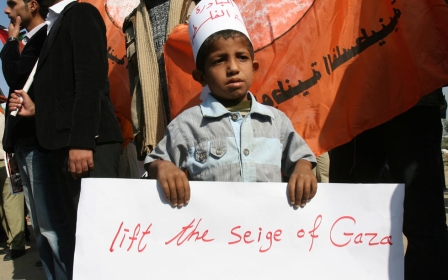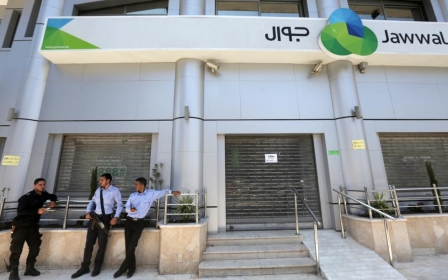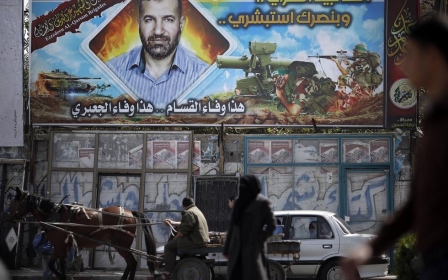Gaza phone network closure exposes rift with West Bank's PA

GAZA CITY – Largely unable to leave the Strip, many in Gaza complain about being cut off from the outside world. With the Israeli blockade ongoing, the sense of isolation can be suffocating. So when news broke last week that the main headquarters of Gaza’s only mobile telephone company, Jawwal, had been shut down, a sense of panic and desperation soon reverberated.
But it wasn’t the Israelis who had taken aim at Jawwal, but rather the attorney general of Gaza’s de facto authorities who ordered the closure and accused the company of “tax-dodging”. According to the authorities, since Hamas took control of the Gaza Strip in 2006, Jawwal has refused to pay taxes to Gaza authorities, as its equivalent branch in Ramallah does to the Palestinian Authority.
The Jawwal Company confirmed to MEE that their office were closed, following an order by Attorney General Ismail Jabr, although the company denied any allegations of wrongdoing.
PalTel chief executive Ammar al-Aker fought back saying in a statement that the closure was “a blow to the interests of citizens, and only adds to the suffering of Gazans”.
A Jawwal director who spoke on the condition of anonymity told MEE that Jawwal’s parent company Palestinian Telecommunications Group (PalTel) was even planning to shut down entirely in protest. If this had happened all landlines and mobiles as well as the internet would have ceased to function.
As the confusion and misinformation about the closure spread, the sense of unease amongst Gaza’s 1.8 million people and 1.3 million Jawwal customers began to grow with many fearful that at the very least, all cellular services in the coastal enclave would soon be withdrawn.
Several Jawwal agents said they have received warnings that any commercial dealings with Jawwal would lead to fines, with some saying they had agreed to pay penalties of up to $1,320 in case they sold any Jawwal phone or service.
Then, five days after the scandal first surfaced, the attorney general appeared to backtrack. On Sunday his office announced that Jawwal would not be closing after all. No reason was given for the closure by the attorney general’s office which has since declined to comment on the incident.
Jawwal vs the Hamas authority
Jawwal’s temporary closure is telling of the widening divisions between Gaza and the West Bank.
Despite the announcement of a unity government last year, there has been little sign that the age-old rift between Hamas and the Palestinian Authority in Ramallah has been resolved and Gaza has found itself increasingly squeezed of funds.
While the tunnel economy once provided $230mn in monthly revenue to Gaza’s authorities, the crackdown on the Egyptian side of the border has caused this revenue stream to all but dry up since former president Mohammed Morsi was ousted in July 2013.
Hamas-run administration impose taxes on most goods coming through Gaza crossings via Israel, which includes food, cars and spare parts. This remains the last source of income for the authorities, but is not deemed nearly enough to fund the services of the government in Gaza.
To make matters worse, about 45,000 public employees in Gaza hired after Hamas took control of the Gaza Strip, remain on partial pay of $264 per month, with the PA refusing to acknowledge employees recruited by Hamas.
The few larger-scale businesses that manage to operate in the anaemic Gaza climate have found themselves torn between which government to pay. Jawwal, as it has since transpired, has been paying its dues to Ramallah where its parent company is headquartered, a legal ambiguity and division that could set the stage for further altercations.
PalTel’s Aker has defended his stance, saying that paying taxes to a government led by Hamas could “bring the company into sanctions by international bodies”, which could harm the company, similar to the case of the Arab Bank which was accused in a US court of supporting terrorist efforts.
However, Gaza authorities argue that the PA does not use the tax collected in Gaza to help the strip. At the height of the dispute, Deputy Minister of Finance Yousef al-Kayali said to Hamas’s TV station al-Aqsa that for every tax dollar collected in Gaza, the PA puts back less than half.
The Democratic Front for the Liberation of Palestine (DFLP), a small Palestinian faction, slammed the de facto authorities' decision in a statement received by MEE.
“This step is going to deepen the crisis… Jawwal Company pays taxes to the official body, the Ministry of Finance, at the consensus government,” the party said in a statement.
Tawfiq Hajaj, a Gaza-based cellphones merchant, said the closure threatened to drag Gaza into a much worse situation, especially if the company should ultimately decide to shut down internet services to Gaza. However, he believes that “it is only right that Jawwal pay taxes to the Gaza de facto authorities who provide security services on the ground, and run the services of Gaza”.
Not many agree with Hajaj, but this could well change if the tax and wages issue heats up further.
Last year, the Hamas authorities ordered banks to be shut for a week after a dispute with the PA over employee wages. Skirmishes between Fatah and Hamas loyalists, as well as the police, soon followed before the issue was eventually resolved.
When Jawwal shut its doors, police were once again out in heavy force in front of the main headquarters of Jawwal in Jala Street to try and prevent outbreaks of violence from unhappy customers, or Gaza residents who wanted to lash out over the lack of payment.
But while violence was avoided this time around, fear has growing in other sectors, including banks operating in Gaza, which still pay taxes to the government in the West Bank. Gaza’s biggest bank the Bank of Palestine is just one of the many institutions that could be affected by the controversy.
“If banks are shut again, then we are stuck, as that is the only connection which remains open between Gaza and the world, despite the tight restrictions imposed on receiving and sending bank transfers,” said Hajaj.
New MEE newsletter: Jerusalem Dispatch
Sign up to get the latest insights and analysis on Israel-Palestine, alongside Turkey Unpacked and other MEE newsletters
Middle East Eye delivers independent and unrivalled coverage and analysis of the Middle East, North Africa and beyond. To learn more about republishing this content and the associated fees, please fill out this form. More about MEE can be found here.





